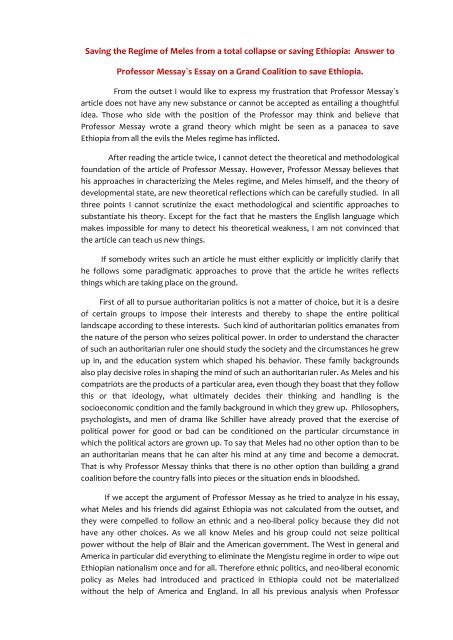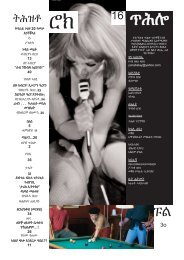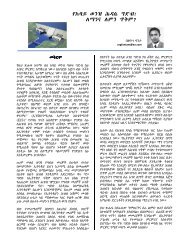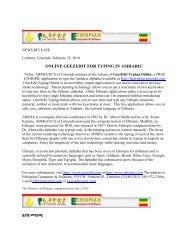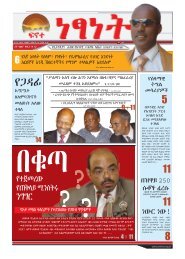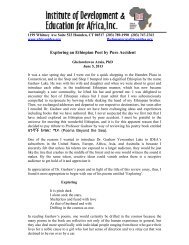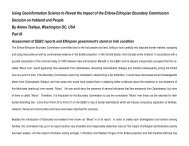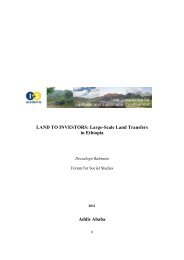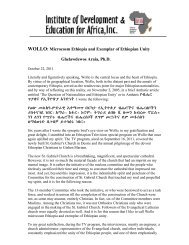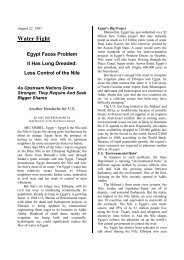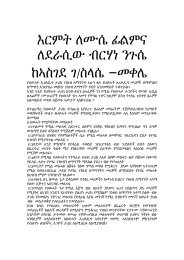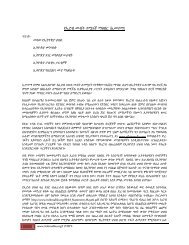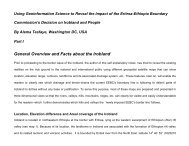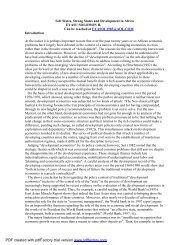Answer To Professor Messay`s Essay on a Grand - Ethiopian Observer
Answer To Professor Messay`s Essay on a Grand - Ethiopian Observer
Answer To Professor Messay`s Essay on a Grand - Ethiopian Observer
You also want an ePaper? Increase the reach of your titles
YUMPU automatically turns print PDFs into web optimized ePapers that Google loves.
Saving the Regime of Meles from a total collapse or saving Ethiopia: <str<strong>on</strong>g>Answer</str<strong>on</strong>g> to<br />
<str<strong>on</strong>g>Professor</str<strong>on</strong>g> <str<strong>on</strong>g>Messay`s</str<strong>on</strong>g> <str<strong>on</strong>g>Essay</str<strong>on</strong>g> <strong>on</strong> a <strong>Grand</strong> Coaliti<strong>on</strong> to save Ethiopia.<br />
From the outset I would like to express my frustrati<strong>on</strong> that <str<strong>on</strong>g>Professor</str<strong>on</strong>g> <str<strong>on</strong>g>Messay`s</str<strong>on</strong>g><br />
article does not have any new substance or cannot be accepted as entailing a thoughtful<br />
idea. Those who side with the positi<strong>on</strong> of the <str<strong>on</strong>g>Professor</str<strong>on</strong>g> may think and believe that<br />
<str<strong>on</strong>g>Professor</str<strong>on</strong>g> Messay wrote a grand theory which might be seen as a panacea to save<br />
Ethiopia from all the evils the Meles regime has inflicted.<br />
After reading the article twice, I cannot detect the theoretical and methodological<br />
foundati<strong>on</strong> of the article of <str<strong>on</strong>g>Professor</str<strong>on</strong>g> Messay. However, <str<strong>on</strong>g>Professor</str<strong>on</strong>g> Messay believes that<br />
his approaches in characterizing the Meles regime, and Meles himself, and the theory of<br />
developmental state, are new theoretical reflecti<strong>on</strong>s which can be carefully studied. In all<br />
three points I cannot scrutinize the exact methodological and scientific approaches to<br />
substantiate his theory. Except for the fact that he masters the English language which<br />
makes impossible for many to detect his theoretical weakness, I am not c<strong>on</strong>vinced that<br />
the article can teach us new things.<br />
If somebody writes such an article he must either explicitly or implicitly clarify that<br />
he follows some paradigmatic approaches to prove that the article he writes reflects<br />
things which are taking place <strong>on</strong> the ground.<br />
First of all to pursue authoritarian politics is not a matter of choice, but it is a desire<br />
of certain groups to impose their interests and thereby to shape the entire political<br />
landscape according to these interests. Such kind of authoritarian politics emanates from<br />
the nature of the pers<strong>on</strong> who seizes political power. In order to understand the character<br />
of such an authoritarian ruler <strong>on</strong>e should study the society and the circumstances he grew<br />
up in, and the educati<strong>on</strong> system which shaped his behavior. These family backgrounds<br />
also play decisive roles in shaping the mind of such an authoritarian ruler. As Meles and his<br />
compatriots are the products of a particular area, even though they boast that they follow<br />
this or that ideology, what ultimately decides their thinking and handling is the<br />
socioec<strong>on</strong>omic c<strong>on</strong>diti<strong>on</strong> and the family background in which they grew up. Philosophers,<br />
psychologists, and men of drama like Schiller have already proved that the exercise of<br />
political power for good or bad can be c<strong>on</strong>diti<strong>on</strong>ed <strong>on</strong> the particular circumstance in<br />
which the political actors are grown up. <str<strong>on</strong>g>To</str<strong>on</strong>g> say that Meles had no other opti<strong>on</strong> than to be<br />
an authoritarian means that he can alter his mind at any time and become a democrat.<br />
That is why <str<strong>on</strong>g>Professor</str<strong>on</strong>g> Messay thinks that there is no other opti<strong>on</strong> than building a grand<br />
coaliti<strong>on</strong> before the country falls into pieces or the situati<strong>on</strong> ends in bloodshed.<br />
If we accept the argument of <str<strong>on</strong>g>Professor</str<strong>on</strong>g> Messay as he tried to analyze in his essay,<br />
what Meles and his friends did against Ethiopia was not calculated from the outset, and<br />
they were compelled to follow an ethnic and a neo-liberal policy because they did not<br />
have any other choices. As we all know Meles and his group could not seize political<br />
power without the help of Blair and the American government. The West in general and<br />
America in particular did everything to eliminate the Mengistu regime in order to wipe out<br />
<strong>Ethiopian</strong> nati<strong>on</strong>alism <strong>on</strong>ce and for all. Therefore ethnic politics, and neo-liberal ec<strong>on</strong>omic<br />
policy as Meles had introduced and practiced in Ethiopia could not be materialized<br />
without the help of America and England. In all his previous analysis when <str<strong>on</strong>g>Professor</str<strong>on</strong>g>
Messay accuses the Meles regime, he either deliberately or unc<strong>on</strong>sciously omits the role<br />
of the Americans and the British in shaping the <strong>Ethiopian</strong> politics over the last 20 years.<br />
Only in a weakened country in which a regime which pursues ethnic or any other politics<br />
which fits the interests of the West and practices a neo-liberal ec<strong>on</strong>omic policy, it is easy<br />
for the West to meddle in the internal affairs. Coming to neo-liberalism, it seems that<br />
<str<strong>on</strong>g>Professor</str<strong>on</strong>g> Messay did not understand the ec<strong>on</strong>omic policy of the Meles regime prior to<br />
the 2005 electi<strong>on</strong>. As if the regime until then did not follow a neo-liberal ec<strong>on</strong>omic policy,<br />
<str<strong>on</strong>g>Professor</str<strong>on</strong>g> Messay tells us that the Meles regime understood well the dangers of neoliberalism<br />
and has d<strong>on</strong>e everything to c<strong>on</strong>vince his comrades to follow his developmental<br />
policy which is strictly regulated and manipulated by the state. <str<strong>on</strong>g>To</str<strong>on</strong>g> my understanding, prior<br />
to the electi<strong>on</strong> of 2005, Meles and his regime had agreed with the IMF and the World Bank<br />
to strictly apply the structural adjustment program (SAP). Devaluati<strong>on</strong> of the <strong>Ethiopian</strong><br />
birr in relati<strong>on</strong> to the US Dollar, privatizati<strong>on</strong>, liberalizati<strong>on</strong> of the internal and foreign<br />
market, reducing state budget for social purposes, so as to canalize the m<strong>on</strong>ey for<br />
productive “purposes”, are all instruments of neo-liberal ec<strong>on</strong>omic policies. In all Sub-<br />
Saharan African countries where such a policy was applied, though the negative effects<br />
vary from country to country, the policy has enriched the few and impoverished the<br />
masses. There are well documented studies which show the negative effects of SAPs. In<br />
short the main agenda of SAP was to de-industrialize Africa and to make her dependent of<br />
<strong>on</strong>e or two raw material or agricultural products. The chaotic situati<strong>on</strong> in many Sub-<br />
Saharan African countries, including Ethiopia, proves that SAPs were designed to<br />
impoverish the entire c<strong>on</strong>tinent and canalize wealth to the capitalist West via different<br />
mechanisms. If any country accepts the shock doctrine of the IMF, it will end in<br />
permanent debt, and payments of this debt permanently by transferring her hardly w<strong>on</strong><br />
wealth every year becomes a natural law which must c<strong>on</strong>tinue indefinitely. It is a<br />
calculated intrigue of the West to systematically unlock such kinds of governments to<br />
pursue a macroec<strong>on</strong>omic ec<strong>on</strong>omic policy which does not work in such backward<br />
countries like that of Ethiopia. After the Meles regime has been applying for almost fifteen<br />
years such a bitter ec<strong>on</strong>omic policy, to say that he has well understood the danger of neoliberalism<br />
is a pure mockery against the <strong>Ethiopian</strong> people. The misunderstanding of the<br />
work of the IMF and the World Bank is not <strong>on</strong>ly the fault of <str<strong>on</strong>g>Professor</str<strong>on</strong>g> Messay, almost over<br />
90% percent of <strong>Ethiopian</strong> ec<strong>on</strong>omists have the same attitudes. Because all hate the Meles<br />
regime, they believe that what our country had to experience over the last 20 years is<br />
solely the work of <strong>on</strong>e dictator. It is perceived that all foreign forces and their<br />
internati<strong>on</strong>al organizati<strong>on</strong>s which shape ec<strong>on</strong>omic policies for Third World Countries are<br />
by their nature innocent. The widespread belief is that African dictators block the<br />
applicati<strong>on</strong> of the policy as is prescribed by the IMF and the school books and thus all<br />
countries are c<strong>on</strong>demned to poverty.<br />
Coming to the developmental state, many development experts, by eliminating social<br />
history and ec<strong>on</strong>omic anthropology from their heads c<strong>on</strong>vinced many that the policy of<br />
developmental state is a new phenomen<strong>on</strong> which can be reduced to few countries. If<br />
<strong>on</strong>e studies the ec<strong>on</strong>omic history of Europe, at least from the fourteenth century<br />
<strong>on</strong>wards, state systems had played crucial roles in shaping and manipulating their<br />
ec<strong>on</strong>omics and social systems. Especially from the sixteenth century <strong>on</strong>wards, European<br />
M<strong>on</strong>archs had pursued an active ec<strong>on</strong>omic policy to develop a home market in their<br />
respective boundaries. Their approaches were holistic, and supported by all available<br />
2
instruments to build a coherent and str<strong>on</strong>g nati<strong>on</strong>. If we c<strong>on</strong>sider Japan, there were well<br />
established relati<strong>on</strong>ships <strong>on</strong> <strong>on</strong>e hand between the German and the Japanese<br />
governments and <strong>on</strong> the other between the United States of America and Japan during<br />
the Mejia dynasty. Japan had sent some young men to Germany to study the ec<strong>on</strong>omic<br />
performance of Germany, and sent others to America to study modern administrati<strong>on</strong><br />
systems. The Mejia dynasty which had well disciplined military organizati<strong>on</strong>s, and which<br />
was determined to modernize the ec<strong>on</strong>omy had forced the industrializati<strong>on</strong> of Japan. The<br />
unique socio-cultural c<strong>on</strong>diti<strong>on</strong> of Japan and their disciplined psychological make-up<br />
helped Japan to materialize her inward looking strategy. Without a disciplined<br />
bureaucracy, and without a unique culture which prevails in the society, it was not<br />
possible for Japan and others to pursue their policies. As <str<strong>on</strong>g>Professor</str<strong>on</strong>g> Messay believes these<br />
countries did not follow a strict free market ec<strong>on</strong>omic policy and the rule of law, but the<br />
unique relati<strong>on</strong>ship that has prevailed between the banking system, the state and the<br />
industrial sector helped the industrializati<strong>on</strong> of Japan and South Korea. During the 80s<br />
South Korea was governed by military dictators which did not allow any political<br />
participati<strong>on</strong>, and the organizati<strong>on</strong> of trade uni<strong>on</strong> was strictly forbidden. As some critical<br />
analysts affirm, foreign debt and military dictatorship are behind the industrializati<strong>on</strong> of<br />
South Korea.<br />
<str<strong>on</strong>g>To</str<strong>on</strong>g> apply in countries like Ethiopia such a strictly state oriented ec<strong>on</strong>omic<br />
development policy like that of Japan and South Korea is an impossible task, because the<br />
cultural situati<strong>on</strong> of the society and the psychological make-up of the intelligentsia are<br />
factors which block any meaningful ec<strong>on</strong>omic agenda. The fragmented and intriguing<br />
characters we have, and the loss of our self-reliance and the lack of theoretical<br />
background, are some of the factors which block our desire to develop Ethiopia. I do not<br />
know any <strong>Ethiopian</strong> ec<strong>on</strong>omist who has extensively studied the role of Mercantilism, and<br />
the Works of Friedrich List, Heinrich Pesch, and others, which are indeed crucial for the<br />
applicati<strong>on</strong> of a developmental state ec<strong>on</strong>omic policy. Neither do I know who has a good<br />
understanding of philosophy and tries to combine philosophy, sociology and cultural<br />
transformati<strong>on</strong> with a kind of renaissance ec<strong>on</strong>omic policy to foster industrializati<strong>on</strong><br />
policy in our country. As so l<strong>on</strong>g as we stick to the market ec<strong>on</strong>omic policy of the IMF and<br />
the World Bank it is practically impossible to get Ethiopia out of the present poverty.<br />
Having this in mind, if we come to the advice of <str<strong>on</strong>g>Professor</str<strong>on</strong>g> Messay to create a powersharing<br />
arrangement with the regime, I do not believe that the Meles regime with such a<br />
bloody past, and which has been selling our country to the so-called foreign investors, and<br />
systematically destabilizes our country so that patriotic feelings could not develop am<strong>on</strong>g<br />
the youth, will accept an arrangement which could save Ethiopia. Meles and his clique are<br />
determined to see a much weakened Ethiopia, and could stay in power when they follow<br />
such an intriguing policy. Foreigners who know the regime very well say that Meles and<br />
his clique hate Ethiopia, and the divide and rule system which they have been<br />
systematically applying nati<strong>on</strong>-wide over the last 20 years weakened the entire nati<strong>on</strong>.<br />
<str<strong>on</strong>g>To</str<strong>on</strong>g>day in Ethiopia we do not have a political elite as <str<strong>on</strong>g>Professor</str<strong>on</strong>g> Messay likes to believe;<br />
instead we have a Mafia system across the country which has corrupted all the local<br />
administrati<strong>on</strong>s. How is it possible to build a grand coaliti<strong>on</strong> with such a regime which likes<br />
to see a very fragmented Ethiopia? Meles like his masters the West hates the c<strong>on</strong>cept of<br />
Nati<strong>on</strong>-State, because <strong>on</strong>ly through a str<strong>on</strong>g Nati<strong>on</strong>-State the people of that country<br />
3
could exercise true freedom, and build a str<strong>on</strong>g ec<strong>on</strong>omy which is based <strong>on</strong> science and<br />
technology. It seems that <str<strong>on</strong>g>Professor</str<strong>on</strong>g> Messay does not know what is going <strong>on</strong> in Ethiopia<br />
and the real ec<strong>on</strong>omic and social c<strong>on</strong>diti<strong>on</strong>s which the <strong>Ethiopian</strong> people are subjected to.<br />
Therefore, not <strong>on</strong>ly from a theoretical, and paradigmatic point of view, but also from the<br />
c<strong>on</strong>diti<strong>on</strong>s which are existing <strong>on</strong> the ground, and from the nature of the regime, the<br />
proposal of <str<strong>on</strong>g>Professor</str<strong>on</strong>g> Messay is not acceptable. It seems that in such a crucial c<strong>on</strong>diti<strong>on</strong><br />
when the regime is in a desperate situati<strong>on</strong> <str<strong>on</strong>g>Professor</str<strong>on</strong>g> Messay tries to divert the attenti<strong>on</strong><br />
of our struggle for a just and democratic Ethiopia and by that saves the Meles regime<br />
from a total collapse.<br />
The writer can be reached at fekadubekele@gmx.de<br />
4


